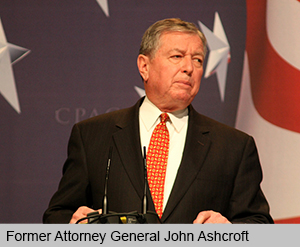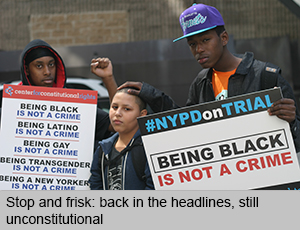| |
| |
| |

CCR at the Supreme Court – taking on John Ashcroft
"The Supreme Court agreed on Tuesday to decide whether high-ranking George W. Bush administration officials… may be held liable for policies adopted after the Sept. 11 attacks," the New York Times reported last week. It was big news — also covered in the Washington Post, Wall Street Journal, and NBC News — about a case that CCR first filed in 2002 and that we have been doggedly pursuing ever since.
The policies in question are the round-up, detention, and abuse of hundreds of Muslim, Arab, and South Asian men after 9/11. The officials include Attorney General John Ashcroft, FBI Director Robert Mueller, and INS Commissioner James Ziglar.
Turkmen v. Ashcroft names both these former Bush administration officials and the prison officials who directly oversaw the abuse as defendants. The district court had allowed only the claims against the prison officials to move forward. The Second Circuit Court of Appeals reinstated the claims against the high-level officials.
For over 14 years, CCR has insisted that no one is above the law, no matter how exalted their role. The appeals court agreed, saying, "The suffering endured by those who were imprisoned merely because they were caught up in the hysteria of the days immediately following 9/11 is not without a remedy."
Now we're preparing to persuade the Supreme Court. "At a time when racial and religious profiling are put forward as serious policy proposals for dealing with everything from immigration to terrorism," Senior Staff Attorney Rachel Meeropol said, "it is more important than ever that the high court affirm that government officials, especially those at the highest levels, can be held accountable when they break the law. We look forward to making that argument before the justices."
|
| |
| |
| |

With stop and frisk back in the news, CCR called on as experts
"The Center for Constitutional Rights (CCR) won its legal challenge to the New York City Police Department's stop-and-frisk policy more than three years ago. But suddenly the phones in our offices are ringing off the hook again," Executive Director Vince Warren wrote in a blog for the Open Society Foundations.
Indeed, from the Washington Post and New York Times to All In with Chris Hayes, Salon, and Mic.com, reporters have been turning to CCR to explain what stop and frisk is, what made it unconstitutional in New York City, and why it would be a terrible idea to resurrect it.
As Senior Staff Attorney Darius Charney, the lead lawyer in our stop-and-frisk case, Floyd v. City of New York, said to Mic.com: "For anybody who wants to address violence in poor, black communities, the most effective way is to tackle poverty, increase economic opportunity and improve education — not to engage in unconstitutional practices."
Speaking of the landmark Floyd case, the joint remedial process in the case – the part of the reform process ordered by the court that requires direct input from the communities most affected by stop and frisk — is gearing up for a series of community forums this fall. You can sign up here for regular updates on the process.
Advocacy Program Manager Nahal Zamani spoke to BRIC TV about the remedial process and other police accountability efforts that CCR and our many community partners are involved in.
|
| |
| |
| |
CCR at 50: Defending the Black Panthers
Saturday marked the 50th anniversary of the founding of the Black Panther Party. Throughout the late 1960s and the 1970s, the BPP faced intense repression and violence, most famously as a target of sabotage, misinformation, agent provocateurs, and lethal force as part of COINTELPRO, and CCR was involved in some of the most significant legal battles over these attacks.
CCR attorneys served as consultants to trial attorneys handling major criminal prosecutions against BPP members in New York, Chicago, and New Haven, challenging serious constitutional violations in those cases. They also participated in legal work following the Chicago police assassination of Fred Hampton and Mark Clark, including participating in the coroner's inquest into their deaths and litigation around grand juries investigating the murders. CCR lawyers also helped to defend BPP Minister of Justice H. Rap Brown on a trumped up charge related to firearm transportation.
The BPP's earliest efforts – monitoring police behavior and challenging police brutality – are particularly resonant in this moment when fatal police shootings of Black people, often captured on video and tragically memorialized on social media, continue unabated fifty years later. CCR is proud to have been an early defender of those fighting police violence, and we are proud of our continued work on the issue today, which includes the recent Freedom of Information Act request, filed with Color of Change, seeking to expose government surveillance of Black Lives Matter activists.
|
|



